Critical Thinking, Management Theories & Tesco's Post-COVID Plan
VerifiedAdded on 2023/06/18
|19
|5746
|135
Report
AI Summary
This report examines the development of critical thinking within the workplace, using Tesco as a case study. It delves into the significance of beliefs, attitudes, and values, differentiating them through theoretical models and assessing their impact on management theories relevant to an assistant manager's role. The report critically evaluates the influence of these factors on workplace behavior and identifies various management theories applicable to the assistant manager role, outlining associated activities. Furthermore, it provides recommendations for addressing challenges Tesco might face following organizational changes in the post-COVID-19 era, emphasizing the importance of planning, workforce respect, and shared responsibilities for enhancing productivity and profitability. Desklib offers a range of similar solved assignments for students.

Developing Workplace
Critical Thinking
Critical Thinking
Paraphrase This Document
Need a fresh take? Get an instant paraphrase of this document with our AI Paraphraser
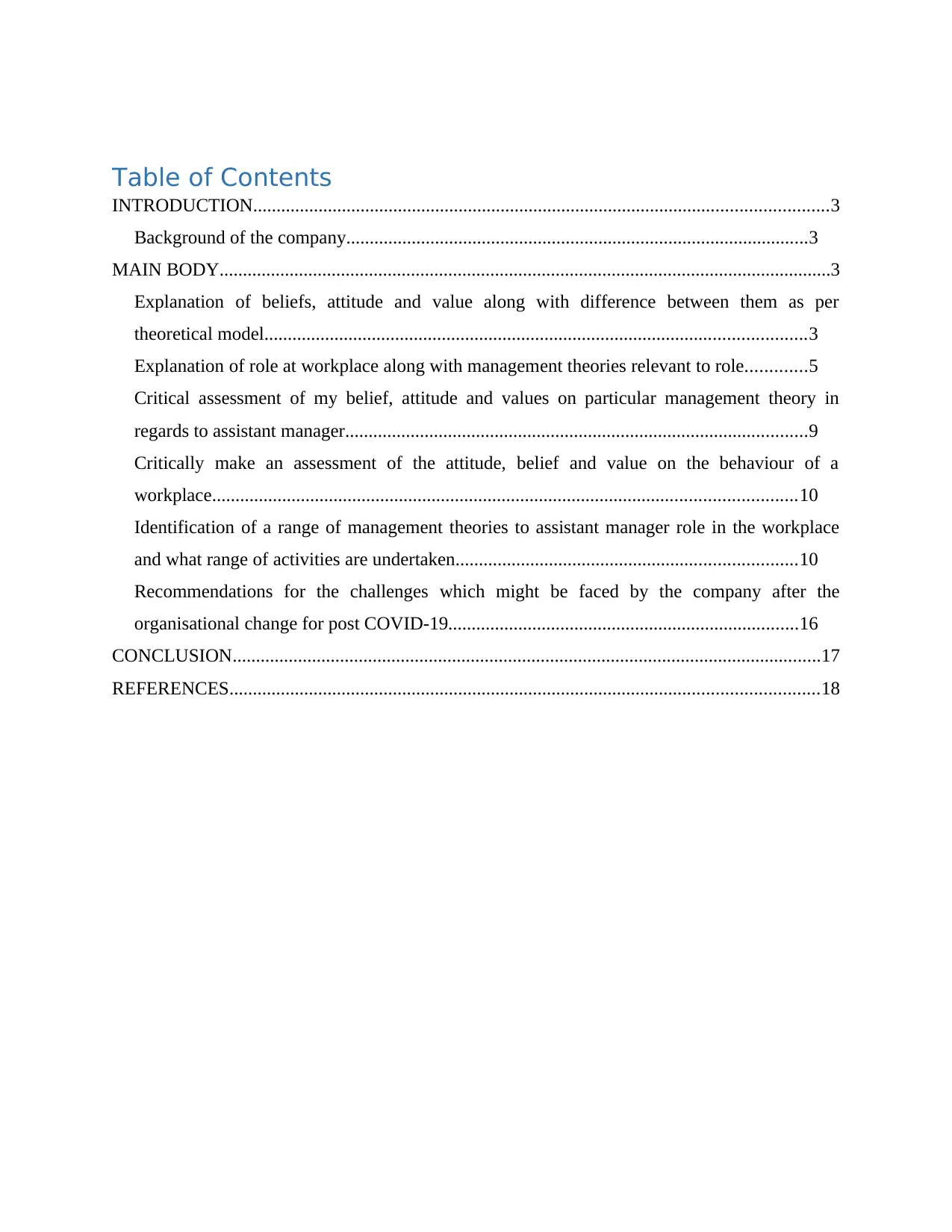
Table of Contents
INTRODUCTION...........................................................................................................................3
Background of the company...................................................................................................3
MAIN BODY...................................................................................................................................3
Explanation of beliefs, attitude and value along with difference between them as per
theoretical model....................................................................................................................3
Explanation of role at workplace along with management theories relevant to role.............5
Critical assessment of my belief, attitude and values on particular management theory in
regards to assistant manager...................................................................................................9
Critically make an assessment of the attitude, belief and value on the behaviour of a
workplace.............................................................................................................................10
Identification of a range of management theories to assistant manager role in the workplace
and what range of activities are undertaken.........................................................................10
Recommendations for the challenges which might be faced by the company after the
organisational change for post COVID-19...........................................................................16
CONCLUSION..............................................................................................................................17
REFERENCES..............................................................................................................................18
INTRODUCTION...........................................................................................................................3
Background of the company...................................................................................................3
MAIN BODY...................................................................................................................................3
Explanation of beliefs, attitude and value along with difference between them as per
theoretical model....................................................................................................................3
Explanation of role at workplace along with management theories relevant to role.............5
Critical assessment of my belief, attitude and values on particular management theory in
regards to assistant manager...................................................................................................9
Critically make an assessment of the attitude, belief and value on the behaviour of a
workplace.............................................................................................................................10
Identification of a range of management theories to assistant manager role in the workplace
and what range of activities are undertaken.........................................................................10
Recommendations for the challenges which might be faced by the company after the
organisational change for post COVID-19...........................................................................16
CONCLUSION..............................................................................................................................17
REFERENCES..............................................................................................................................18
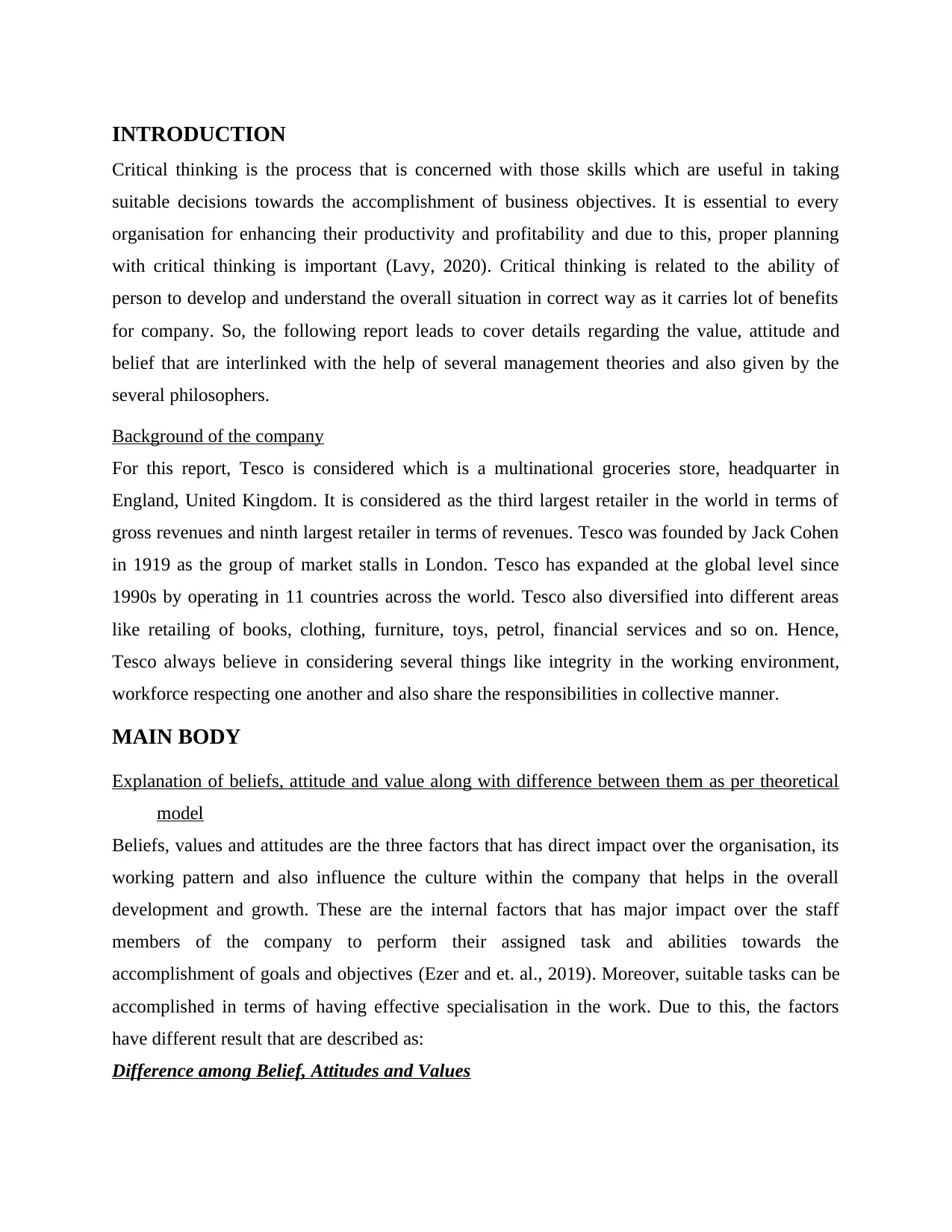
INTRODUCTION
Critical thinking is the process that is concerned with those skills which are useful in taking
suitable decisions towards the accomplishment of business objectives. It is essential to every
organisation for enhancing their productivity and profitability and due to this, proper planning
with critical thinking is important (Lavy, 2020). Critical thinking is related to the ability of
person to develop and understand the overall situation in correct way as it carries lot of benefits
for company. So, the following report leads to cover details regarding the value, attitude and
belief that are interlinked with the help of several management theories and also given by the
several philosophers.
Background of the company
For this report, Tesco is considered which is a multinational groceries store, headquarter in
England, United Kingdom. It is considered as the third largest retailer in the world in terms of
gross revenues and ninth largest retailer in terms of revenues. Tesco was founded by Jack Cohen
in 1919 as the group of market stalls in London. Tesco has expanded at the global level since
1990s by operating in 11 countries across the world. Tesco also diversified into different areas
like retailing of books, clothing, furniture, toys, petrol, financial services and so on. Hence,
Tesco always believe in considering several things like integrity in the working environment,
workforce respecting one another and also share the responsibilities in collective manner.
MAIN BODY
Explanation of beliefs, attitude and value along with difference between them as per theoretical
model
Beliefs, values and attitudes are the three factors that has direct impact over the organisation, its
working pattern and also influence the culture within the company that helps in the overall
development and growth. These are the internal factors that has major impact over the staff
members of the company to perform their assigned task and abilities towards the
accomplishment of goals and objectives (Ezer and et. al., 2019). Moreover, suitable tasks can be
accomplished in terms of having effective specialisation in the work. Due to this, the factors
have different result that are described as:
Difference among Belief, Attitudes and Values
Critical thinking is the process that is concerned with those skills which are useful in taking
suitable decisions towards the accomplishment of business objectives. It is essential to every
organisation for enhancing their productivity and profitability and due to this, proper planning
with critical thinking is important (Lavy, 2020). Critical thinking is related to the ability of
person to develop and understand the overall situation in correct way as it carries lot of benefits
for company. So, the following report leads to cover details regarding the value, attitude and
belief that are interlinked with the help of several management theories and also given by the
several philosophers.
Background of the company
For this report, Tesco is considered which is a multinational groceries store, headquarter in
England, United Kingdom. It is considered as the third largest retailer in the world in terms of
gross revenues and ninth largest retailer in terms of revenues. Tesco was founded by Jack Cohen
in 1919 as the group of market stalls in London. Tesco has expanded at the global level since
1990s by operating in 11 countries across the world. Tesco also diversified into different areas
like retailing of books, clothing, furniture, toys, petrol, financial services and so on. Hence,
Tesco always believe in considering several things like integrity in the working environment,
workforce respecting one another and also share the responsibilities in collective manner.
MAIN BODY
Explanation of beliefs, attitude and value along with difference between them as per theoretical
model
Beliefs, values and attitudes are the three factors that has direct impact over the organisation, its
working pattern and also influence the culture within the company that helps in the overall
development and growth. These are the internal factors that has major impact over the staff
members of the company to perform their assigned task and abilities towards the
accomplishment of goals and objectives (Ezer and et. al., 2019). Moreover, suitable tasks can be
accomplished in terms of having effective specialisation in the work. Due to this, the factors
have different result that are described as:
Difference among Belief, Attitudes and Values
⊘ This is a preview!⊘
Do you want full access?
Subscribe today to unlock all pages.

Trusted by 1+ million students worldwide
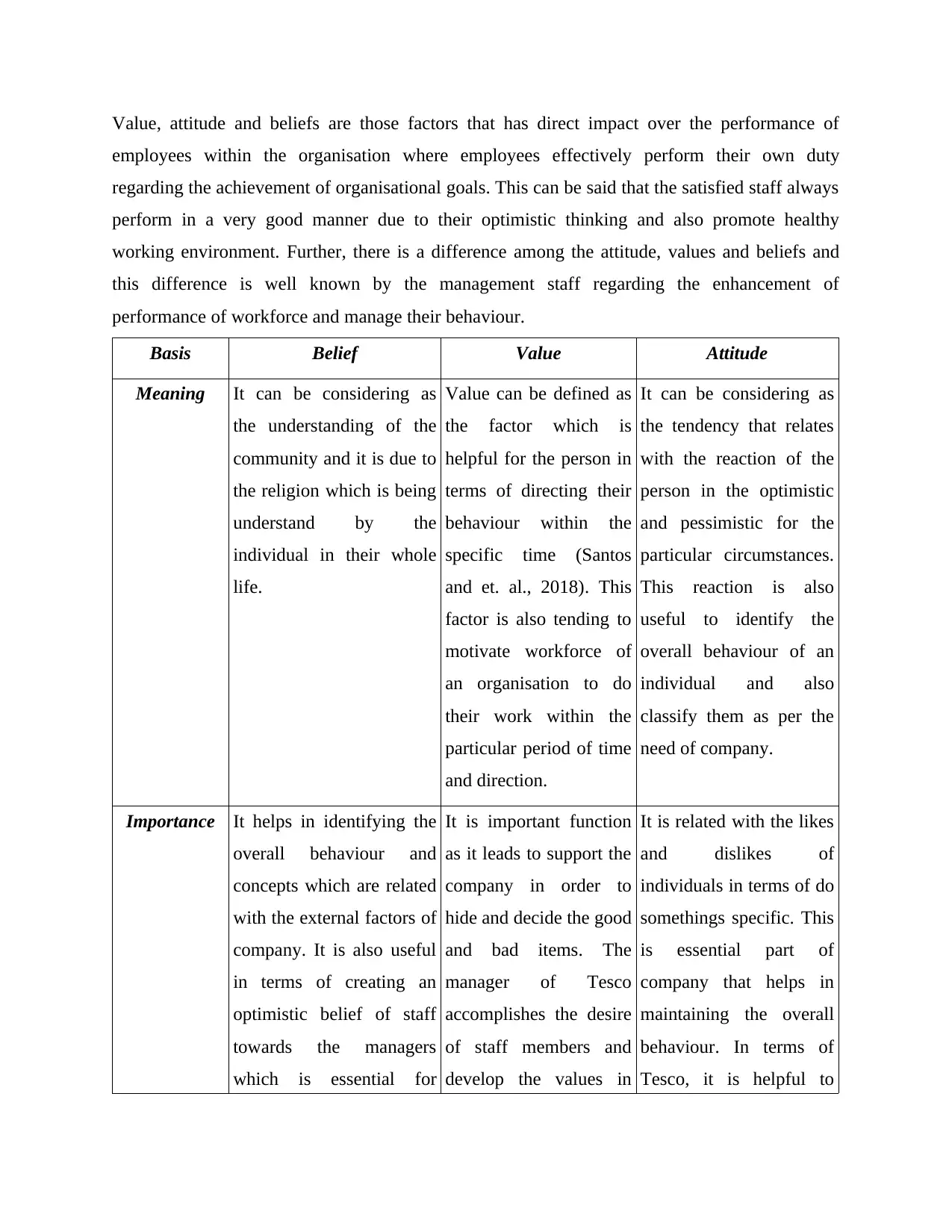
Value, attitude and beliefs are those factors that has direct impact over the performance of
employees within the organisation where employees effectively perform their own duty
regarding the achievement of organisational goals. This can be said that the satisfied staff always
perform in a very good manner due to their optimistic thinking and also promote healthy
working environment. Further, there is a difference among the attitude, values and beliefs and
this difference is well known by the management staff regarding the enhancement of
performance of workforce and manage their behaviour.
Basis Belief Value Attitude
Meaning It can be considering as
the understanding of the
community and it is due to
the religion which is being
understand by the
individual in their whole
life.
Value can be defined as
the factor which is
helpful for the person in
terms of directing their
behaviour within the
specific time (Santos
and et. al., 2018). This
factor is also tending to
motivate workforce of
an organisation to do
their work within the
particular period of time
and direction.
It can be considering as
the tendency that relates
with the reaction of the
person in the optimistic
and pessimistic for the
particular circumstances.
This reaction is also
useful to identify the
overall behaviour of an
individual and also
classify them as per the
need of company.
Importance It helps in identifying the
overall behaviour and
concepts which are related
with the external factors of
company. It is also useful
in terms of creating an
optimistic belief of staff
towards the managers
which is essential for
It is important function
as it leads to support the
company in order to
hide and decide the good
and bad items. The
manager of Tesco
accomplishes the desire
of staff members and
develop the values in
It is related with the likes
and dislikes of
individuals in terms of do
somethings specific. This
is essential part of
company that helps in
maintaining the overall
behaviour. In terms of
Tesco, it is helpful to
employees within the organisation where employees effectively perform their own duty
regarding the achievement of organisational goals. This can be said that the satisfied staff always
perform in a very good manner due to their optimistic thinking and also promote healthy
working environment. Further, there is a difference among the attitude, values and beliefs and
this difference is well known by the management staff regarding the enhancement of
performance of workforce and manage their behaviour.
Basis Belief Value Attitude
Meaning It can be considering as
the understanding of the
community and it is due to
the religion which is being
understand by the
individual in their whole
life.
Value can be defined as
the factor which is
helpful for the person in
terms of directing their
behaviour within the
specific time (Santos
and et. al., 2018). This
factor is also tending to
motivate workforce of
an organisation to do
their work within the
particular period of time
and direction.
It can be considering as
the tendency that relates
with the reaction of the
person in the optimistic
and pessimistic for the
particular circumstances.
This reaction is also
useful to identify the
overall behaviour of an
individual and also
classify them as per the
need of company.
Importance It helps in identifying the
overall behaviour and
concepts which are related
with the external factors of
company. It is also useful
in terms of creating an
optimistic belief of staff
towards the managers
which is essential for
It is important function
as it leads to support the
company in order to
hide and decide the good
and bad items. The
manager of Tesco
accomplishes the desire
of staff members and
develop the values in
It is related with the likes
and dislikes of
individuals in terms of do
somethings specific. This
is essential part of
company that helps in
maintaining the overall
behaviour. In terms of
Tesco, it is helpful to
Paraphrase This Document
Need a fresh take? Get an instant paraphrase of this document with our AI Paraphraser
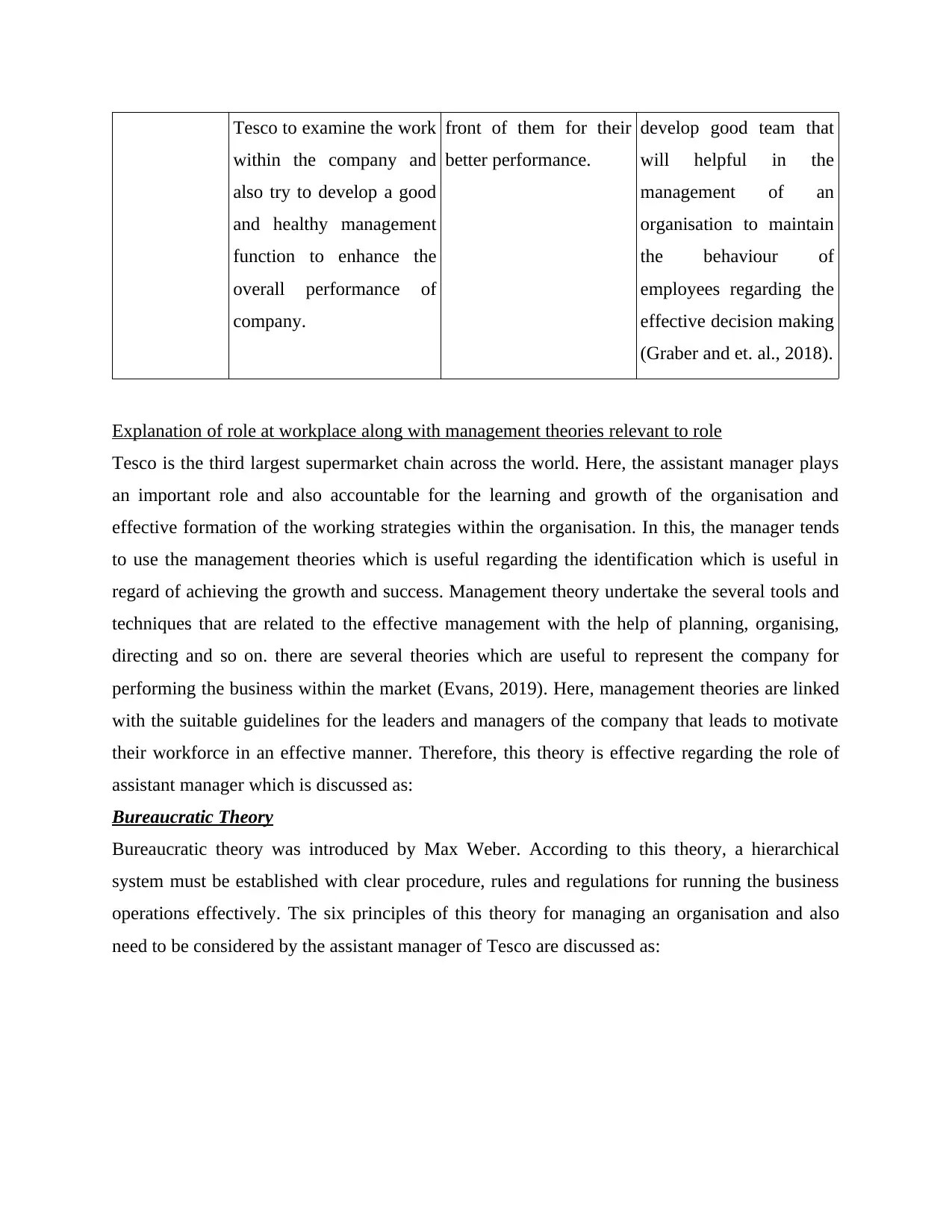
Tesco to examine the work
within the company and
also try to develop a good
and healthy management
function to enhance the
overall performance of
company.
front of them for their
better performance.
develop good team that
will helpful in the
management of an
organisation to maintain
the behaviour of
employees regarding the
effective decision making
(Graber and et. al., 2018).
Explanation of role at workplace along with management theories relevant to role
Tesco is the third largest supermarket chain across the world. Here, the assistant manager plays
an important role and also accountable for the learning and growth of the organisation and
effective formation of the working strategies within the organisation. In this, the manager tends
to use the management theories which is useful regarding the identification which is useful in
regard of achieving the growth and success. Management theory undertake the several tools and
techniques that are related to the effective management with the help of planning, organising,
directing and so on. there are several theories which are useful to represent the company for
performing the business within the market (Evans, 2019). Here, management theories are linked
with the suitable guidelines for the leaders and managers of the company that leads to motivate
their workforce in an effective manner. Therefore, this theory is effective regarding the role of
assistant manager which is discussed as:
Bureaucratic Theory
Bureaucratic theory was introduced by Max Weber. According to this theory, a hierarchical
system must be established with clear procedure, rules and regulations for running the business
operations effectively. The six principles of this theory for managing an organisation and also
need to be considered by the assistant manager of Tesco are discussed as:
within the company and
also try to develop a good
and healthy management
function to enhance the
overall performance of
company.
front of them for their
better performance.
develop good team that
will helpful in the
management of an
organisation to maintain
the behaviour of
employees regarding the
effective decision making
(Graber and et. al., 2018).
Explanation of role at workplace along with management theories relevant to role
Tesco is the third largest supermarket chain across the world. Here, the assistant manager plays
an important role and also accountable for the learning and growth of the organisation and
effective formation of the working strategies within the organisation. In this, the manager tends
to use the management theories which is useful regarding the identification which is useful in
regard of achieving the growth and success. Management theory undertake the several tools and
techniques that are related to the effective management with the help of planning, organising,
directing and so on. there are several theories which are useful to represent the company for
performing the business within the market (Evans, 2019). Here, management theories are linked
with the suitable guidelines for the leaders and managers of the company that leads to motivate
their workforce in an effective manner. Therefore, this theory is effective regarding the role of
assistant manager which is discussed as:
Bureaucratic Theory
Bureaucratic theory was introduced by Max Weber. According to this theory, a hierarchical
system must be established with clear procedure, rules and regulations for running the business
operations effectively. The six principles of this theory for managing an organisation and also
need to be considered by the assistant manager of Tesco are discussed as:
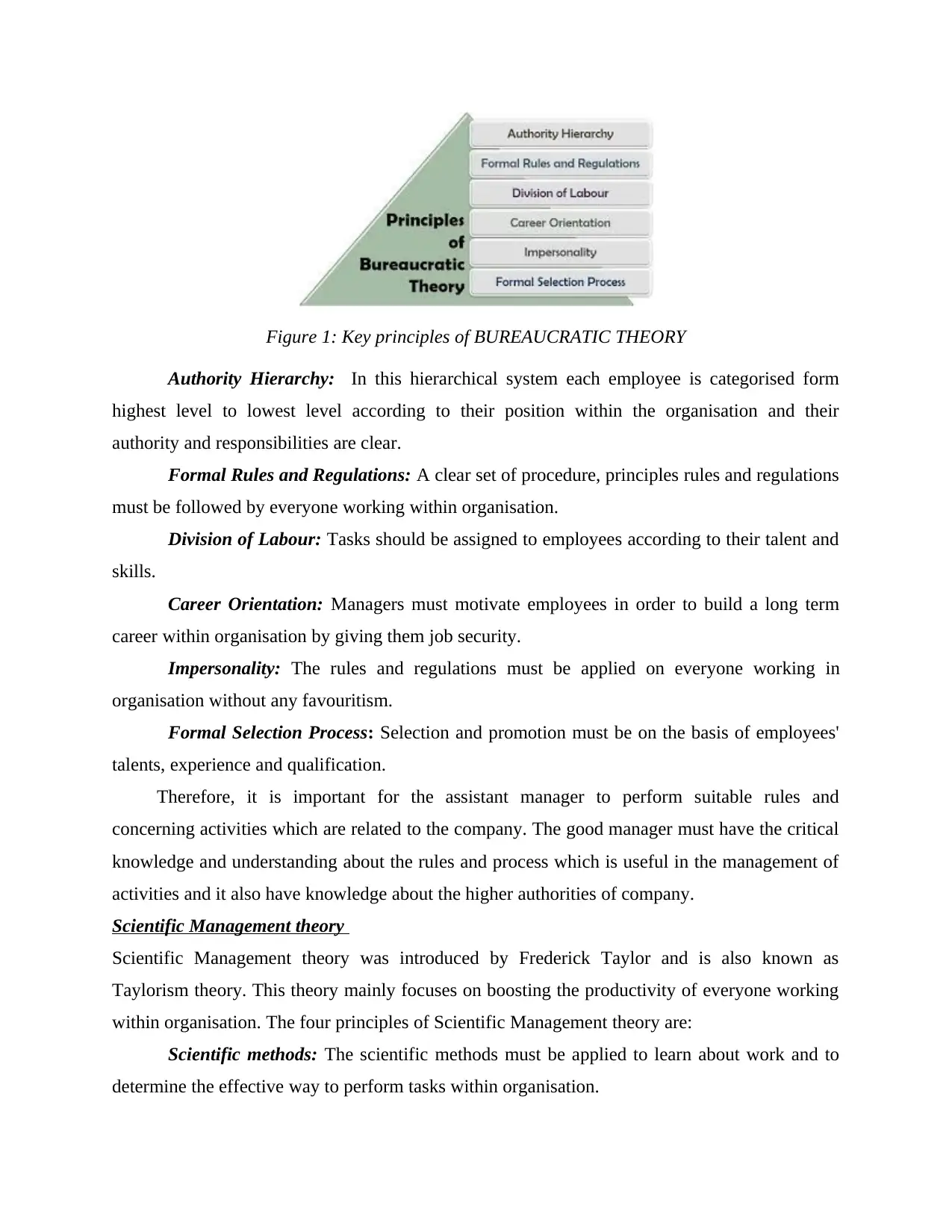
Figure 1: Key principles of BUREAUCRATIC THEORY
Authority Hierarchy: In this hierarchical system each employee is categorised form
highest level to lowest level according to their position within the organisation and their
authority and responsibilities are clear.
Formal Rules and Regulations: A clear set of procedure, principles rules and regulations
must be followed by everyone working within organisation.
Division of Labour: Tasks should be assigned to employees according to their talent and
skills.
Career Orientation: Managers must motivate employees in order to build a long term
career within organisation by giving them job security.
Impersonality: The rules and regulations must be applied on everyone working in
organisation without any favouritism.
Formal Selection Process: Selection and promotion must be on the basis of employees'
talents, experience and qualification.
Therefore, it is important for the assistant manager to perform suitable rules and
concerning activities which are related to the company. The good manager must have the critical
knowledge and understanding about the rules and process which is useful in the management of
activities and it also have knowledge about the higher authorities of company.
Scientific Management theory
Scientific Management theory was introduced by Frederick Taylor and is also known as
Taylorism theory. This theory mainly focuses on boosting the productivity of everyone working
within organisation. The four principles of Scientific Management theory are:
Scientific methods: The scientific methods must be applied to learn about work and to
determine the effective way to perform tasks within organisation.
Authority Hierarchy: In this hierarchical system each employee is categorised form
highest level to lowest level according to their position within the organisation and their
authority and responsibilities are clear.
Formal Rules and Regulations: A clear set of procedure, principles rules and regulations
must be followed by everyone working within organisation.
Division of Labour: Tasks should be assigned to employees according to their talent and
skills.
Career Orientation: Managers must motivate employees in order to build a long term
career within organisation by giving them job security.
Impersonality: The rules and regulations must be applied on everyone working in
organisation without any favouritism.
Formal Selection Process: Selection and promotion must be on the basis of employees'
talents, experience and qualification.
Therefore, it is important for the assistant manager to perform suitable rules and
concerning activities which are related to the company. The good manager must have the critical
knowledge and understanding about the rules and process which is useful in the management of
activities and it also have knowledge about the higher authorities of company.
Scientific Management theory
Scientific Management theory was introduced by Frederick Taylor and is also known as
Taylorism theory. This theory mainly focuses on boosting the productivity of everyone working
within organisation. The four principles of Scientific Management theory are:
Scientific methods: The scientific methods must be applied to learn about work and to
determine the effective way to perform tasks within organisation.
⊘ This is a preview!⊘
Do you want full access?
Subscribe today to unlock all pages.

Trusted by 1+ million students worldwide
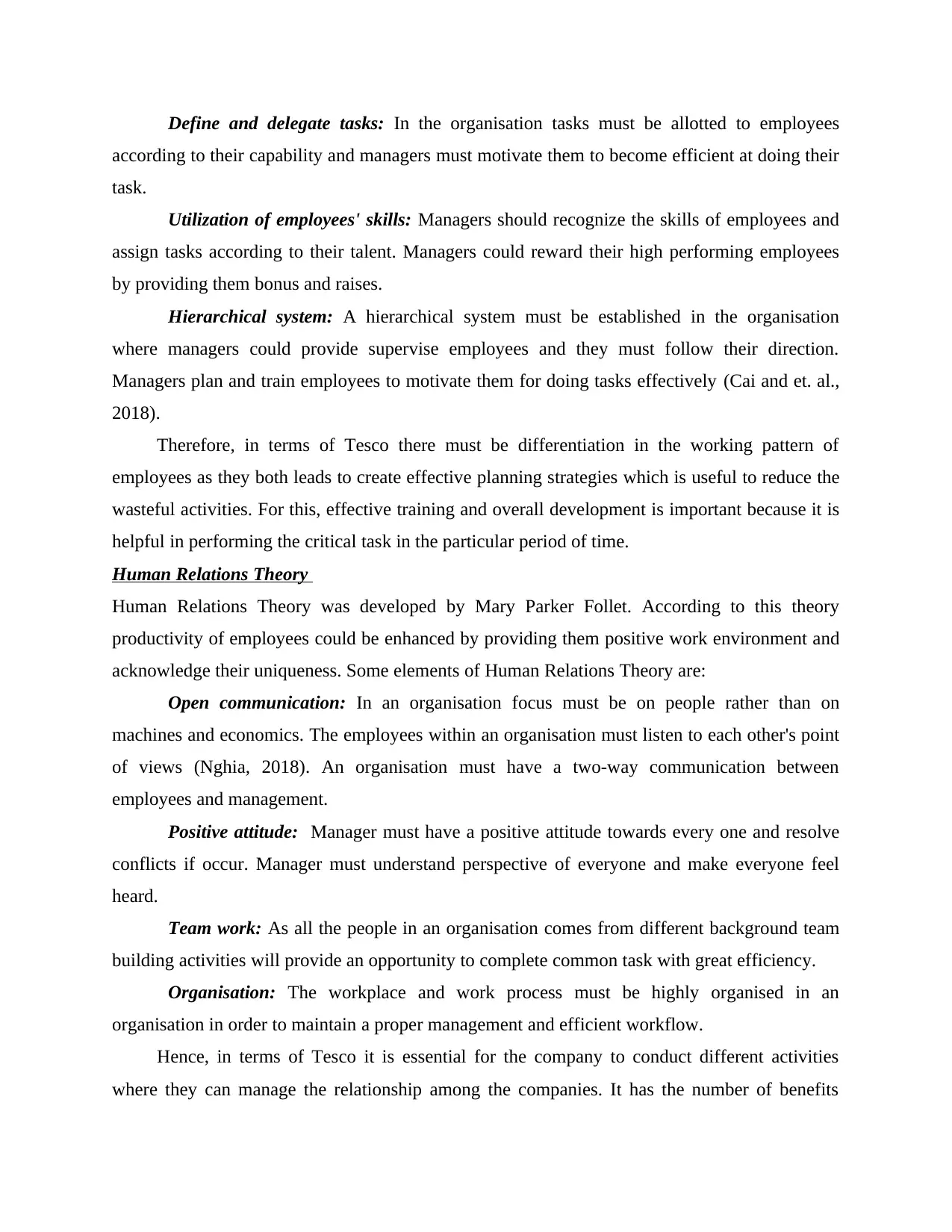
Define and delegate tasks: In the organisation tasks must be allotted to employees
according to their capability and managers must motivate them to become efficient at doing their
task.
Utilization of employees' skills: Managers should recognize the skills of employees and
assign tasks according to their talent. Managers could reward their high performing employees
by providing them bonus and raises.
Hierarchical system: A hierarchical system must be established in the organisation
where managers could provide supervise employees and they must follow their direction.
Managers plan and train employees to motivate them for doing tasks effectively (Cai and et. al.,
2018).
Therefore, in terms of Tesco there must be differentiation in the working pattern of
employees as they both leads to create effective planning strategies which is useful to reduce the
wasteful activities. For this, effective training and overall development is important because it is
helpful in performing the critical task in the particular period of time.
Human Relations Theory
Human Relations Theory was developed by Mary Parker Follet. According to this theory
productivity of employees could be enhanced by providing them positive work environment and
acknowledge their uniqueness. Some elements of Human Relations Theory are:
Open communication: In an organisation focus must be on people rather than on
machines and economics. The employees within an organisation must listen to each other's point
of views (Nghia, 2018). An organisation must have a two-way communication between
employees and management.
Positive attitude: Manager must have a positive attitude towards every one and resolve
conflicts if occur. Manager must understand perspective of everyone and make everyone feel
heard.
Team work: As all the people in an organisation comes from different background team
building activities will provide an opportunity to complete common task with great efficiency.
Organisation: The workplace and work process must be highly organised in an
organisation in order to maintain a proper management and efficient workflow.
Hence, in terms of Tesco it is essential for the company to conduct different activities
where they can manage the relationship among the companies. It has the number of benefits
according to their capability and managers must motivate them to become efficient at doing their
task.
Utilization of employees' skills: Managers should recognize the skills of employees and
assign tasks according to their talent. Managers could reward their high performing employees
by providing them bonus and raises.
Hierarchical system: A hierarchical system must be established in the organisation
where managers could provide supervise employees and they must follow their direction.
Managers plan and train employees to motivate them for doing tasks effectively (Cai and et. al.,
2018).
Therefore, in terms of Tesco there must be differentiation in the working pattern of
employees as they both leads to create effective planning strategies which is useful to reduce the
wasteful activities. For this, effective training and overall development is important because it is
helpful in performing the critical task in the particular period of time.
Human Relations Theory
Human Relations Theory was developed by Mary Parker Follet. According to this theory
productivity of employees could be enhanced by providing them positive work environment and
acknowledge their uniqueness. Some elements of Human Relations Theory are:
Open communication: In an organisation focus must be on people rather than on
machines and economics. The employees within an organisation must listen to each other's point
of views (Nghia, 2018). An organisation must have a two-way communication between
employees and management.
Positive attitude: Manager must have a positive attitude towards every one and resolve
conflicts if occur. Manager must understand perspective of everyone and make everyone feel
heard.
Team work: As all the people in an organisation comes from different background team
building activities will provide an opportunity to complete common task with great efficiency.
Organisation: The workplace and work process must be highly organised in an
organisation in order to maintain a proper management and efficient workflow.
Hence, in terms of Tesco it is essential for the company to conduct different activities
where they can manage the relationship among the companies. It has the number of benefits
Paraphrase This Document
Need a fresh take? Get an instant paraphrase of this document with our AI Paraphraser
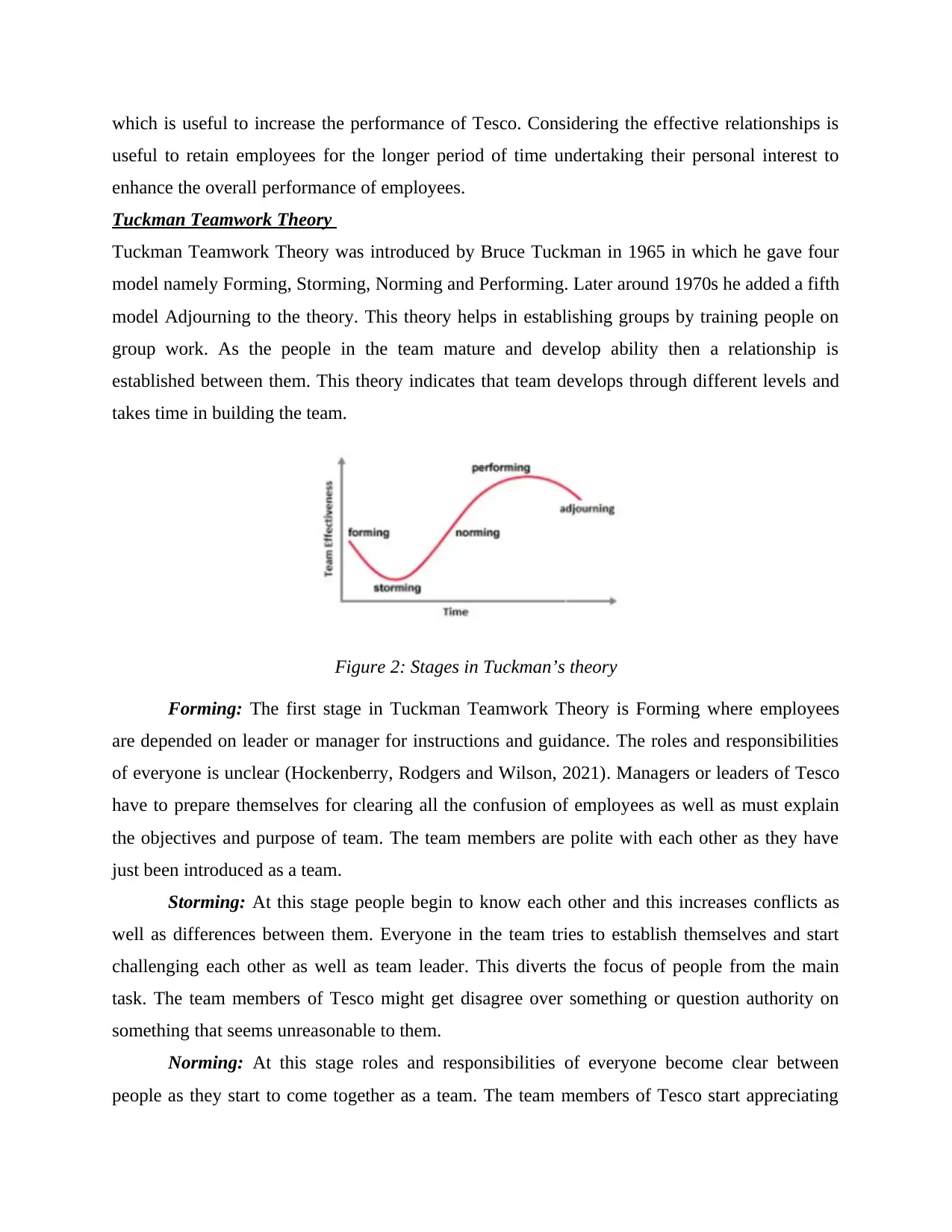
which is useful to increase the performance of Tesco. Considering the effective relationships is
useful to retain employees for the longer period of time undertaking their personal interest to
enhance the overall performance of employees.
Tuckman Teamwork Theory
Tuckman Teamwork Theory was introduced by Bruce Tuckman in 1965 in which he gave four
model namely Forming, Storming, Norming and Performing. Later around 1970s he added a fifth
model Adjourning to the theory. This theory helps in establishing groups by training people on
group work. As the people in the team mature and develop ability then a relationship is
established between them. This theory indicates that team develops through different levels and
takes time in building the team.
Figure 2: Stages in Tuckman’s theory
Forming: The first stage in Tuckman Teamwork Theory is Forming where employees
are depended on leader or manager for instructions and guidance. The roles and responsibilities
of everyone is unclear (Hockenberry, Rodgers and Wilson, 2021). Managers or leaders of Tesco
have to prepare themselves for clearing all the confusion of employees as well as must explain
the objectives and purpose of team. The team members are polite with each other as they have
just been introduced as a team.
Storming: At this stage people begin to know each other and this increases conflicts as
well as differences between them. Everyone in the team tries to establish themselves and start
challenging each other as well as team leader. This diverts the focus of people from the main
task. The team members of Tesco might get disagree over something or question authority on
something that seems unreasonable to them.
Norming: At this stage roles and responsibilities of everyone become clear between
people as they start to come together as a team. The team members of Tesco start appreciating
useful to retain employees for the longer period of time undertaking their personal interest to
enhance the overall performance of employees.
Tuckman Teamwork Theory
Tuckman Teamwork Theory was introduced by Bruce Tuckman in 1965 in which he gave four
model namely Forming, Storming, Norming and Performing. Later around 1970s he added a fifth
model Adjourning to the theory. This theory helps in establishing groups by training people on
group work. As the people in the team mature and develop ability then a relationship is
established between them. This theory indicates that team develops through different levels and
takes time in building the team.
Figure 2: Stages in Tuckman’s theory
Forming: The first stage in Tuckman Teamwork Theory is Forming where employees
are depended on leader or manager for instructions and guidance. The roles and responsibilities
of everyone is unclear (Hockenberry, Rodgers and Wilson, 2021). Managers or leaders of Tesco
have to prepare themselves for clearing all the confusion of employees as well as must explain
the objectives and purpose of team. The team members are polite with each other as they have
just been introduced as a team.
Storming: At this stage people begin to know each other and this increases conflicts as
well as differences between them. Everyone in the team tries to establish themselves and start
challenging each other as well as team leader. This diverts the focus of people from the main
task. The team members of Tesco might get disagree over something or question authority on
something that seems unreasonable to them.
Norming: At this stage roles and responsibilities of everyone become clear between
people as they start to come together as a team. The team members of Tesco start appreciating
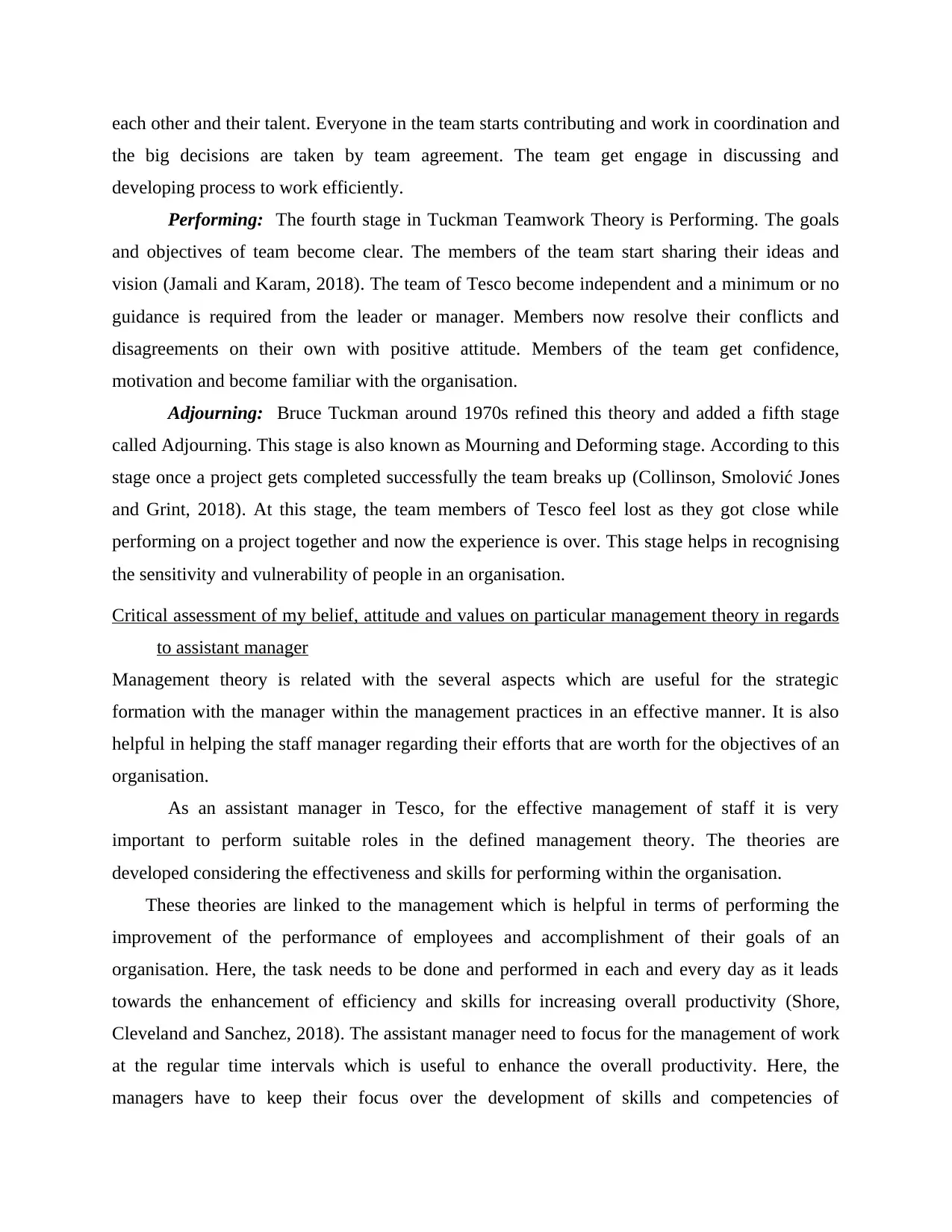
each other and their talent. Everyone in the team starts contributing and work in coordination and
the big decisions are taken by team agreement. The team get engage in discussing and
developing process to work efficiently.
Performing: The fourth stage in Tuckman Teamwork Theory is Performing. The goals
and objectives of team become clear. The members of the team start sharing their ideas and
vision (Jamali and Karam, 2018). The team of Tesco become independent and a minimum or no
guidance is required from the leader or manager. Members now resolve their conflicts and
disagreements on their own with positive attitude. Members of the team get confidence,
motivation and become familiar with the organisation.
Adjourning: Bruce Tuckman around 1970s refined this theory and added a fifth stage
called Adjourning. This stage is also known as Mourning and Deforming stage. According to this
stage once a project gets completed successfully the team breaks up (Collinson, Smolović Jones
and Grint, 2018). At this stage, the team members of Tesco feel lost as they got close while
performing on a project together and now the experience is over. This stage helps in recognising
the sensitivity and vulnerability of people in an organisation.
Critical assessment of my belief, attitude and values on particular management theory in regards
to assistant manager
Management theory is related with the several aspects which are useful for the strategic
formation with the manager within the management practices in an effective manner. It is also
helpful in helping the staff manager regarding their efforts that are worth for the objectives of an
organisation.
As an assistant manager in Tesco, for the effective management of staff it is very
important to perform suitable roles in the defined management theory. The theories are
developed considering the effectiveness and skills for performing within the organisation.
These theories are linked to the management which is helpful in terms of performing the
improvement of the performance of employees and accomplishment of their goals of an
organisation. Here, the task needs to be done and performed in each and every day as it leads
towards the enhancement of efficiency and skills for increasing overall productivity (Shore,
Cleveland and Sanchez, 2018). The assistant manager need to focus for the management of work
at the regular time intervals which is useful to enhance the overall productivity. Here, the
managers have to keep their focus over the development of skills and competencies of
the big decisions are taken by team agreement. The team get engage in discussing and
developing process to work efficiently.
Performing: The fourth stage in Tuckman Teamwork Theory is Performing. The goals
and objectives of team become clear. The members of the team start sharing their ideas and
vision (Jamali and Karam, 2018). The team of Tesco become independent and a minimum or no
guidance is required from the leader or manager. Members now resolve their conflicts and
disagreements on their own with positive attitude. Members of the team get confidence,
motivation and become familiar with the organisation.
Adjourning: Bruce Tuckman around 1970s refined this theory and added a fifth stage
called Adjourning. This stage is also known as Mourning and Deforming stage. According to this
stage once a project gets completed successfully the team breaks up (Collinson, Smolović Jones
and Grint, 2018). At this stage, the team members of Tesco feel lost as they got close while
performing on a project together and now the experience is over. This stage helps in recognising
the sensitivity and vulnerability of people in an organisation.
Critical assessment of my belief, attitude and values on particular management theory in regards
to assistant manager
Management theory is related with the several aspects which are useful for the strategic
formation with the manager within the management practices in an effective manner. It is also
helpful in helping the staff manager regarding their efforts that are worth for the objectives of an
organisation.
As an assistant manager in Tesco, for the effective management of staff it is very
important to perform suitable roles in the defined management theory. The theories are
developed considering the effectiveness and skills for performing within the organisation.
These theories are linked to the management which is helpful in terms of performing the
improvement of the performance of employees and accomplishment of their goals of an
organisation. Here, the task needs to be done and performed in each and every day as it leads
towards the enhancement of efficiency and skills for increasing overall productivity (Shore,
Cleveland and Sanchez, 2018). The assistant manager need to focus for the management of work
at the regular time intervals which is useful to enhance the overall productivity. Here, the
managers have to keep their focus over the development of skills and competencies of
⊘ This is a preview!⊘
Do you want full access?
Subscribe today to unlock all pages.

Trusted by 1+ million students worldwide
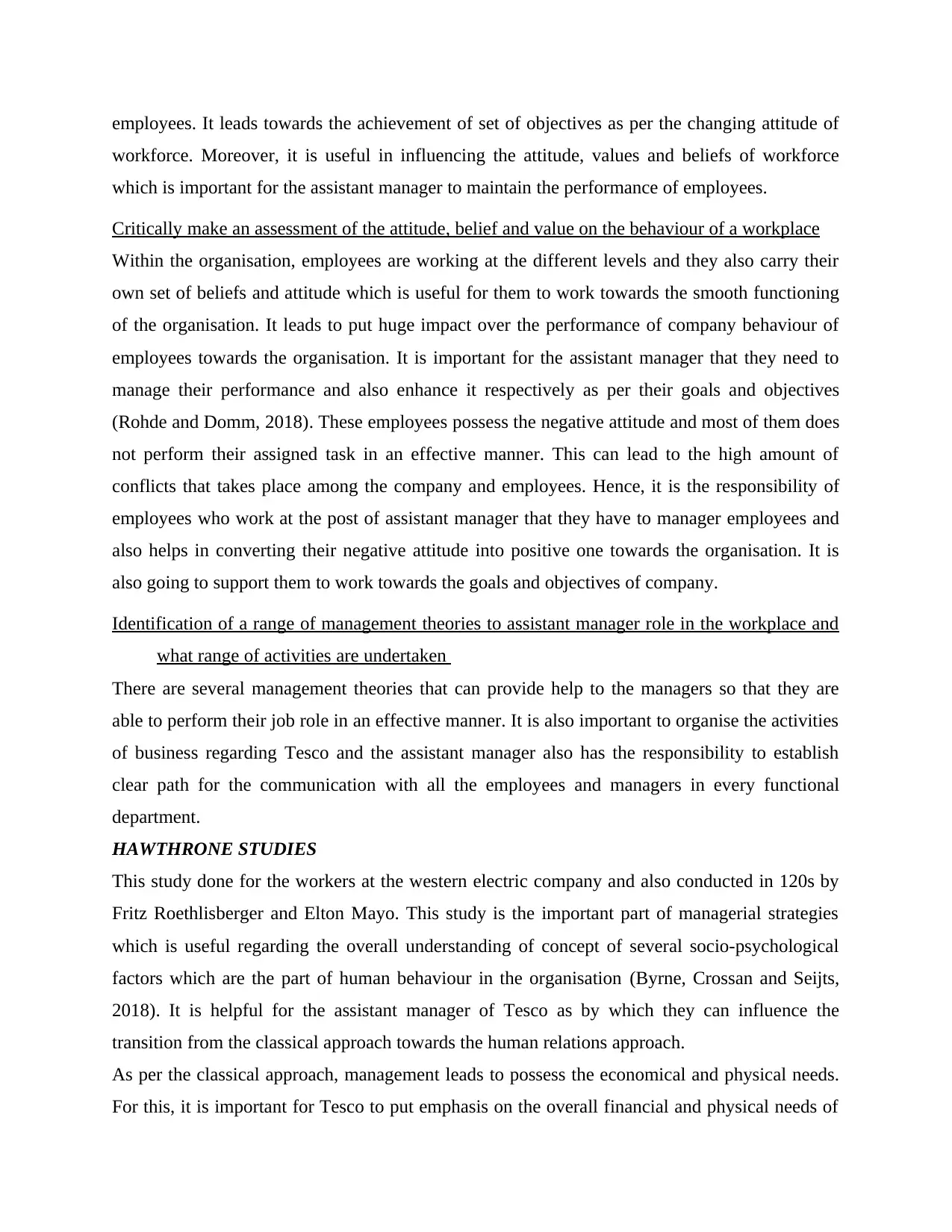
employees. It leads towards the achievement of set of objectives as per the changing attitude of
workforce. Moreover, it is useful in influencing the attitude, values and beliefs of workforce
which is important for the assistant manager to maintain the performance of employees.
Critically make an assessment of the attitude, belief and value on the behaviour of a workplace
Within the organisation, employees are working at the different levels and they also carry their
own set of beliefs and attitude which is useful for them to work towards the smooth functioning
of the organisation. It leads to put huge impact over the performance of company behaviour of
employees towards the organisation. It is important for the assistant manager that they need to
manage their performance and also enhance it respectively as per their goals and objectives
(Rohde and Domm, 2018). These employees possess the negative attitude and most of them does
not perform their assigned task in an effective manner. This can lead to the high amount of
conflicts that takes place among the company and employees. Hence, it is the responsibility of
employees who work at the post of assistant manager that they have to manager employees and
also helps in converting their negative attitude into positive one towards the organisation. It is
also going to support them to work towards the goals and objectives of company.
Identification of a range of management theories to assistant manager role in the workplace and
what range of activities are undertaken
There are several management theories that can provide help to the managers so that they are
able to perform their job role in an effective manner. It is also important to organise the activities
of business regarding Tesco and the assistant manager also has the responsibility to establish
clear path for the communication with all the employees and managers in every functional
department.
HAWTHRONE STUDIES
This study done for the workers at the western electric company and also conducted in 120s by
Fritz Roethlisberger and Elton Mayo. This study is the important part of managerial strategies
which is useful regarding the overall understanding of concept of several socio-psychological
factors which are the part of human behaviour in the organisation (Byrne, Crossan and Seijts,
2018). It is helpful for the assistant manager of Tesco as by which they can influence the
transition from the classical approach towards the human relations approach.
As per the classical approach, management leads to possess the economical and physical needs.
For this, it is important for Tesco to put emphasis on the overall financial and physical needs of
workforce. Moreover, it is useful in influencing the attitude, values and beliefs of workforce
which is important for the assistant manager to maintain the performance of employees.
Critically make an assessment of the attitude, belief and value on the behaviour of a workplace
Within the organisation, employees are working at the different levels and they also carry their
own set of beliefs and attitude which is useful for them to work towards the smooth functioning
of the organisation. It leads to put huge impact over the performance of company behaviour of
employees towards the organisation. It is important for the assistant manager that they need to
manage their performance and also enhance it respectively as per their goals and objectives
(Rohde and Domm, 2018). These employees possess the negative attitude and most of them does
not perform their assigned task in an effective manner. This can lead to the high amount of
conflicts that takes place among the company and employees. Hence, it is the responsibility of
employees who work at the post of assistant manager that they have to manager employees and
also helps in converting their negative attitude into positive one towards the organisation. It is
also going to support them to work towards the goals and objectives of company.
Identification of a range of management theories to assistant manager role in the workplace and
what range of activities are undertaken
There are several management theories that can provide help to the managers so that they are
able to perform their job role in an effective manner. It is also important to organise the activities
of business regarding Tesco and the assistant manager also has the responsibility to establish
clear path for the communication with all the employees and managers in every functional
department.
HAWTHRONE STUDIES
This study done for the workers at the western electric company and also conducted in 120s by
Fritz Roethlisberger and Elton Mayo. This study is the important part of managerial strategies
which is useful regarding the overall understanding of concept of several socio-psychological
factors which are the part of human behaviour in the organisation (Byrne, Crossan and Seijts,
2018). It is helpful for the assistant manager of Tesco as by which they can influence the
transition from the classical approach towards the human relations approach.
As per the classical approach, management leads to possess the economical and physical needs.
For this, it is important for Tesco to put emphasis on the overall financial and physical needs of
Paraphrase This Document
Need a fresh take? Get an instant paraphrase of this document with our AI Paraphraser
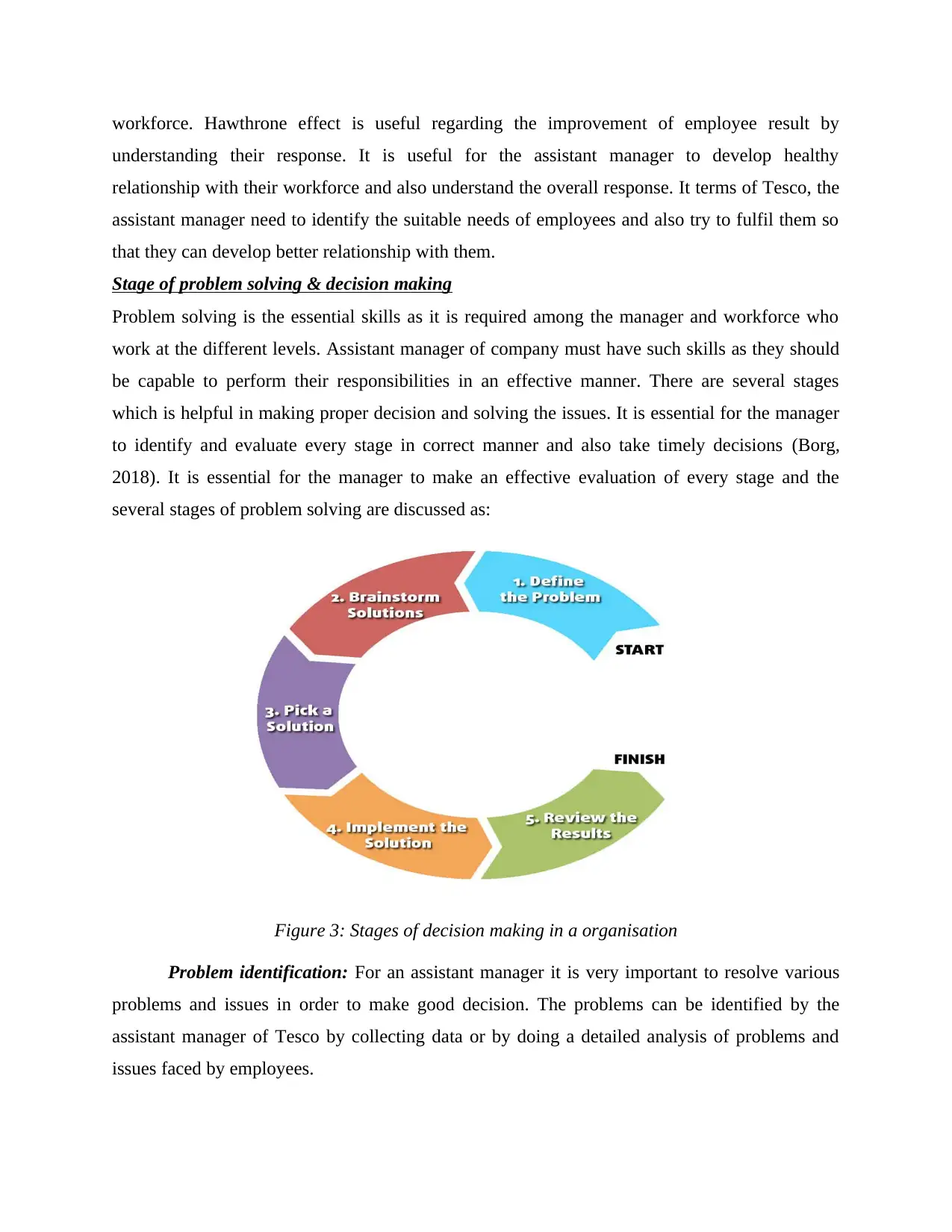
workforce. Hawthrone effect is useful regarding the improvement of employee result by
understanding their response. It is useful for the assistant manager to develop healthy
relationship with their workforce and also understand the overall response. It terms of Tesco, the
assistant manager need to identify the suitable needs of employees and also try to fulfil them so
that they can develop better relationship with them.
Stage of problem solving & decision making
Problem solving is the essential skills as it is required among the manager and workforce who
work at the different levels. Assistant manager of company must have such skills as they should
be capable to perform their responsibilities in an effective manner. There are several stages
which is helpful in making proper decision and solving the issues. It is essential for the manager
to identify and evaluate every stage in correct manner and also take timely decisions (Borg,
2018). It is essential for the manager to make an effective evaluation of every stage and the
several stages of problem solving are discussed as:
Figure 3: Stages of decision making in a organisation
Problem identification: For an assistant manager it is very important to resolve various
problems and issues in order to make good decision. The problems can be identified by the
assistant manager of Tesco by collecting data or by doing a detailed analysis of problems and
issues faced by employees.
understanding their response. It is useful for the assistant manager to develop healthy
relationship with their workforce and also understand the overall response. It terms of Tesco, the
assistant manager need to identify the suitable needs of employees and also try to fulfil them so
that they can develop better relationship with them.
Stage of problem solving & decision making
Problem solving is the essential skills as it is required among the manager and workforce who
work at the different levels. Assistant manager of company must have such skills as they should
be capable to perform their responsibilities in an effective manner. There are several stages
which is helpful in making proper decision and solving the issues. It is essential for the manager
to identify and evaluate every stage in correct manner and also take timely decisions (Borg,
2018). It is essential for the manager to make an effective evaluation of every stage and the
several stages of problem solving are discussed as:
Figure 3: Stages of decision making in a organisation
Problem identification: For an assistant manager it is very important to resolve various
problems and issues in order to make good decision. The problems can be identified by the
assistant manager of Tesco by collecting data or by doing a detailed analysis of problems and
issues faced by employees.
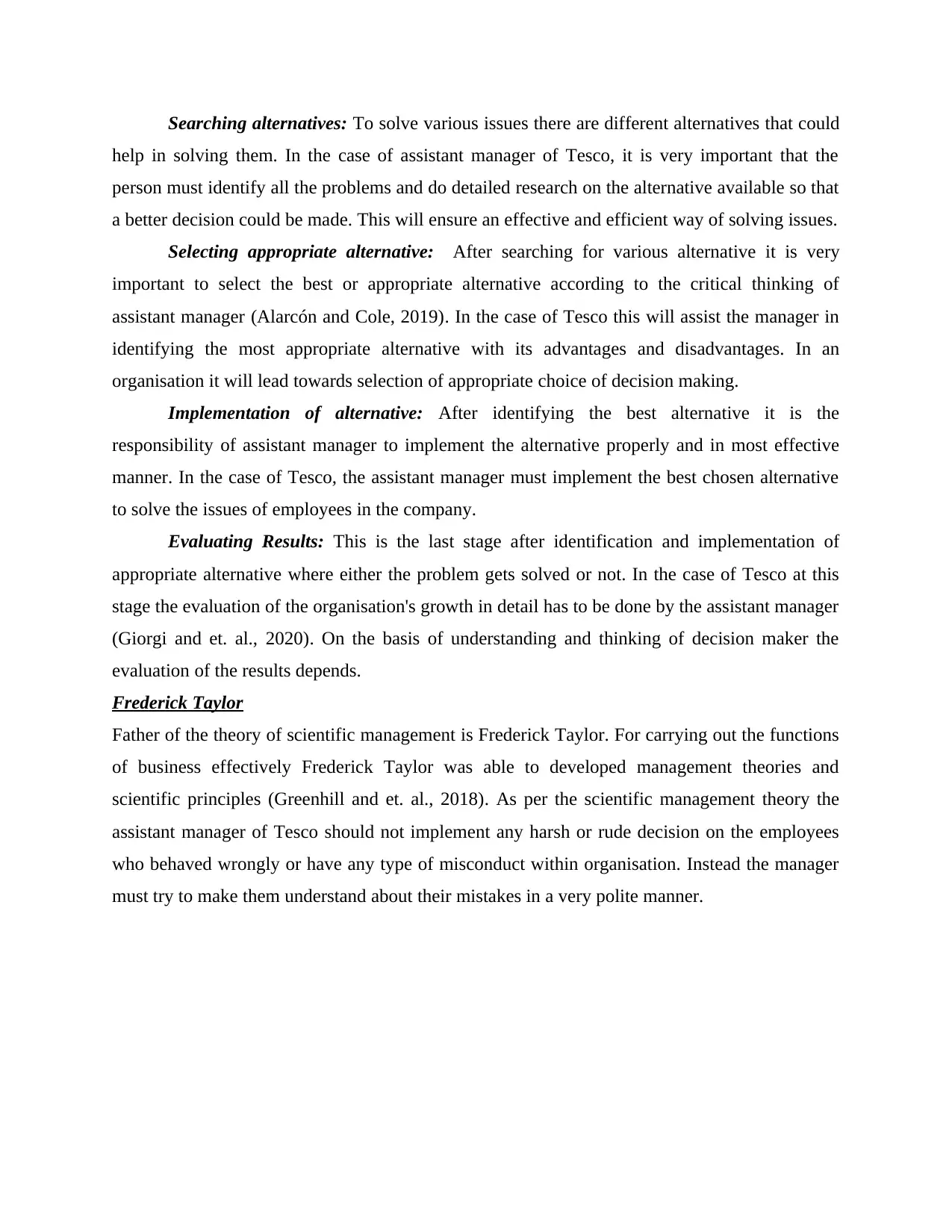
Searching alternatives: To solve various issues there are different alternatives that could
help in solving them. In the case of assistant manager of Tesco, it is very important that the
person must identify all the problems and do detailed research on the alternative available so that
a better decision could be made. This will ensure an effective and efficient way of solving issues.
Selecting appropriate alternative: After searching for various alternative it is very
important to select the best or appropriate alternative according to the critical thinking of
assistant manager (Alarcón and Cole, 2019). In the case of Tesco this will assist the manager in
identifying the most appropriate alternative with its advantages and disadvantages. In an
organisation it will lead towards selection of appropriate choice of decision making.
Implementation of alternative: After identifying the best alternative it is the
responsibility of assistant manager to implement the alternative properly and in most effective
manner. In the case of Tesco, the assistant manager must implement the best chosen alternative
to solve the issues of employees in the company.
Evaluating Results: This is the last stage after identification and implementation of
appropriate alternative where either the problem gets solved or not. In the case of Tesco at this
stage the evaluation of the organisation's growth in detail has to be done by the assistant manager
(Giorgi and et. al., 2020). On the basis of understanding and thinking of decision maker the
evaluation of the results depends.
Frederick Taylor
Father of the theory of scientific management is Frederick Taylor. For carrying out the functions
of business effectively Frederick Taylor was able to developed management theories and
scientific principles (Greenhill and et. al., 2018). As per the scientific management theory the
assistant manager of Tesco should not implement any harsh or rude decision on the employees
who behaved wrongly or have any type of misconduct within organisation. Instead the manager
must try to make them understand about their mistakes in a very polite manner.
help in solving them. In the case of assistant manager of Tesco, it is very important that the
person must identify all the problems and do detailed research on the alternative available so that
a better decision could be made. This will ensure an effective and efficient way of solving issues.
Selecting appropriate alternative: After searching for various alternative it is very
important to select the best or appropriate alternative according to the critical thinking of
assistant manager (Alarcón and Cole, 2019). In the case of Tesco this will assist the manager in
identifying the most appropriate alternative with its advantages and disadvantages. In an
organisation it will lead towards selection of appropriate choice of decision making.
Implementation of alternative: After identifying the best alternative it is the
responsibility of assistant manager to implement the alternative properly and in most effective
manner. In the case of Tesco, the assistant manager must implement the best chosen alternative
to solve the issues of employees in the company.
Evaluating Results: This is the last stage after identification and implementation of
appropriate alternative where either the problem gets solved or not. In the case of Tesco at this
stage the evaluation of the organisation's growth in detail has to be done by the assistant manager
(Giorgi and et. al., 2020). On the basis of understanding and thinking of decision maker the
evaluation of the results depends.
Frederick Taylor
Father of the theory of scientific management is Frederick Taylor. For carrying out the functions
of business effectively Frederick Taylor was able to developed management theories and
scientific principles (Greenhill and et. al., 2018). As per the scientific management theory the
assistant manager of Tesco should not implement any harsh or rude decision on the employees
who behaved wrongly or have any type of misconduct within organisation. Instead the manager
must try to make them understand about their mistakes in a very polite manner.
⊘ This is a preview!⊘
Do you want full access?
Subscribe today to unlock all pages.

Trusted by 1+ million students worldwide
1 out of 19
Related Documents
Your All-in-One AI-Powered Toolkit for Academic Success.
+13062052269
info@desklib.com
Available 24*7 on WhatsApp / Email
![[object Object]](/_next/static/media/star-bottom.7253800d.svg)
Unlock your academic potential
Copyright © 2020–2026 A2Z Services. All Rights Reserved. Developed and managed by ZUCOL.





